
An Aspergers Guide to Entrepreneurship
by the same author
An Asperger Leaders Guide to Living and Leading Change
Rosalind A. Bergemann
Foreword by Will Napier
ISBN 978 1 84905 471 3
eISBN 978 0 85700 872 5
An Aspergers Guide to Public Speaking
How to Excel at Public Speaking for Professionals with Autism Spectrum Disorder
Rosalind A. Bergemann
ISBN 978 1 84905 516 1
eISBN 978 0 85700 979 1
of related interest
Aspergers Syndrome Workplace Survival Guide
A Neurotypicals Secrets for Success
Barbara Bissonnette
Foreword by Yvona Fast
ISBN 978 1 84905 943 5
eISBN 978 0 85700 807 7
Managing with Asperger Syndrome
Malcolm Johnson
ISBN 978 1 84310 199 4
eISBN 978 1 84642 029 0
Business for Aspies
42 Best Practices for Using Asperger Syndrome Traits at Work Successfully
Ashley Stanford
ISBN 978 1 84905 845 2
eISBN 978 0 85700 501 4
AutiPower!
Successful Living and Working with an Autism Spectrum Disorder
Herman Jansen and Betty Rombout
ISBN 978 1 84905 437 9
eISBN 978 0 85700 869 5
An Aspergers Guide to
Entrepreneurship
Setting Up Your Own Business for
Professionals with Autism Spectrum Disorder
Rosalind A. Bergemann
Foreword by Michael John Carley

Jessica Kingsley Publishers
London and Philadelphia
First published in 2015
by Jessica Kingsley Publishers
73 Collier Street
London N1 9BE, UK
and
400 Market Street, Suite 400
Philadelphia, PA 19106, USA
www.jkp.com
Copyright Rosalind A. Bergemann 2015
Foreword Michael John Carley
All rights reserved. No part of this publication may be reproduced in any material form (including photocopying or storing it in any medium by electronic means other than those marked with a  and whether or not transiently or incidentally to some other use of this publication other than those marked with a
and whether or not transiently or incidentally to some other use of this publication other than those marked with a  ) without the written permission of the copyright owner except in accordance with the provisions of the Copyright, Designs and Patents Act 1988 or under the terms of a licence issued by the Copyright Licensing Agency Ltd, Saffron House, 610 Kirby Street, London EC1N 8TS. Applications for the copyright owners written permission to reproduce any part of this publication should be addressed to the publisher.
) without the written permission of the copyright owner except in accordance with the provisions of the Copyright, Designs and Patents Act 1988 or under the terms of a licence issued by the Copyright Licensing Agency Ltd, Saffron House, 610 Kirby Street, London EC1N 8TS. Applications for the copyright owners written permission to reproduce any part of this publication should be addressed to the publisher.
Warning: The doing of an unauthorised act in relation to a copyright work may result in both a civil claim for damages and criminal prosecution.
All pages marked with a  can be downloaded at www.jkp.com/catalogue/9781849055093/resources for personal use, but may not be reproduced for any other purposes without the permission of the publisher.
can be downloaded at www.jkp.com/catalogue/9781849055093/resources for personal use, but may not be reproduced for any other purposes without the permission of the publisher.
Library of Congress Cataloging in Publication Data
A CIP catalog record for this book is available from the Library of Congress
British Library Cataloguing in Publication Data
A CIP catalogue record for this book is available from the British Library
ISBN 978 1 84905 509 3
eISBN 978 0 85700 978 4
This book is dedicated to all those outstanding individuals on the
autism spectrum who have either taken the step to become professionals
within their own companies, or are on the journey to doing so.
It is also dedicated to my daughter Dawn, who continues
to inspire, motivate and encourage me every day!
Contents
Foreword
The unemployment crisis in the developed world is well known, if not felt; and part of the reason why were so well-informed is that labor research focuses much of its efforts on the jobless their percentages, and the wide-ranging sociological consequences of their dilemma. But almost no research has ever gone into the realm of employee dissatisfaction, especially when it comes to the percentage of the workforce that is diagnosed along the autism spectrum. Granted, spectrum or not, getting study participants to be honest about how dissatisfied they are in existing jobs would be a tough task for any researcher no one wants to tick off their employers with traceable comments that, in a tough job market, could lead to the employees dismissal. But still, the near-absence of any real, quantifiable information herein is surprising.
Thanks to such a shortage of information, we do not know for certain that millions are dissatisfied with their existing jobs; yet in our hearts, we do (know this to be true). And fellow spectrumites are perhaps even more at risk herein. We feel stuck in unwanted jobs for many possible reasons the corporate atmosphere that relies so heavily on socialization, the sensory demands of the office itself, the lack of interest in our companys products, the frustration of a boss whose intelligence doesnt measure up to ours; or any of the thousands of other elements I can think up (including the aforementioned shortage of open positions to transition towards, which affects everyone). But our spectrum uncertainty also adds to our fears the risk factor of leaving, if not embarking on a business of our own feels infinitely heavier to us due to our lack of social confidence (one could argue that our ideal job is anthropologist, as we are destined to labor proportionately harder when learning how the world works). No matter how good we are at what we do and in the right positions we are very good our capacity for feeling stuck seems higher.
Adding to this malaise is the knowledge that too many of us would probably fare much better in a start-up; a business designed around a special interest that feeds our heightened capacity for passionate focus, and that we run as we see fit. We know wed be great in this role, but we justifiably wonder if were being delusional, if were in denial, or just that we dont fully know what we need in order to make this dream come true.
Today, the word entrepreneurship is hot. Stories of billion-dollar start-ups fill the business sections of our newspapers, and lifestyle articles often chronicle the journey that the single mother took to create a web-based business that, while paying less than a phone app purchased by Google or Facebook, has given her a steady income and the flexible hours to care for her child. These stories, combined with a record-high dissatisfaction with the corporate world have now embedded entrepreneurship in our psyches not as the fluke, fringe alternative to a real job that it was once thought to be; but now as perhaps a last, imperative resort, if not an exciting new path. The myth that you need an MBA to create a successful business is gone, and the powerful few are infinitely less on the lookout for conformists, and more so for entrepreneurial spirit, as well as the outside the box thinking that the autism spectrum can so often produce. Silicon Valley (a town I half-joke that we spectrumites built) has taught the world a lot.
Granted, the odds of a start-up succeeding are small maybe even as small as making it as an actor in New York or London. But should a start-up fail, a new start-up can emerge, this time with the added knowledge and experience to give the new creation a better chance of success than the previous attempt. And as an entrepreneur your only requirement is to find something you really want to do, making sure it can be successful (keeping in mind that nothing is foolproof), and then you make it successful. There will be lots to learn, yes; but the spectrum mind is well suited to this task. We can be sponges when it comes to information that we want to learn.
Next page
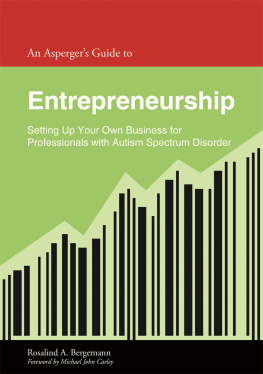


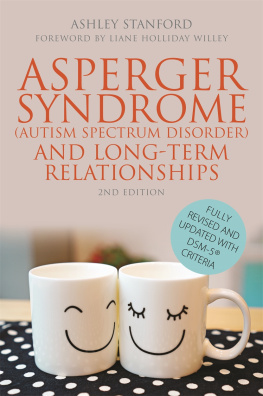

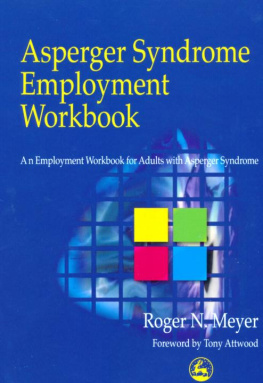


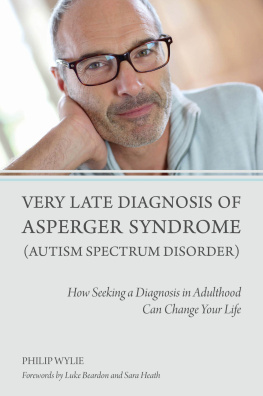
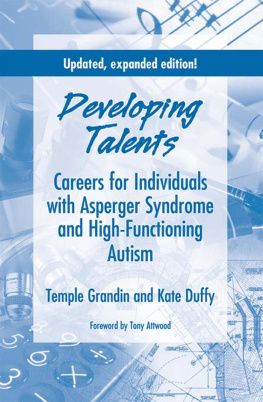
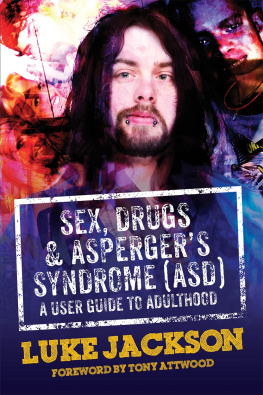


 and whether or not transiently or incidentally to some other use of this publication other than those marked with a
and whether or not transiently or incidentally to some other use of this publication other than those marked with a